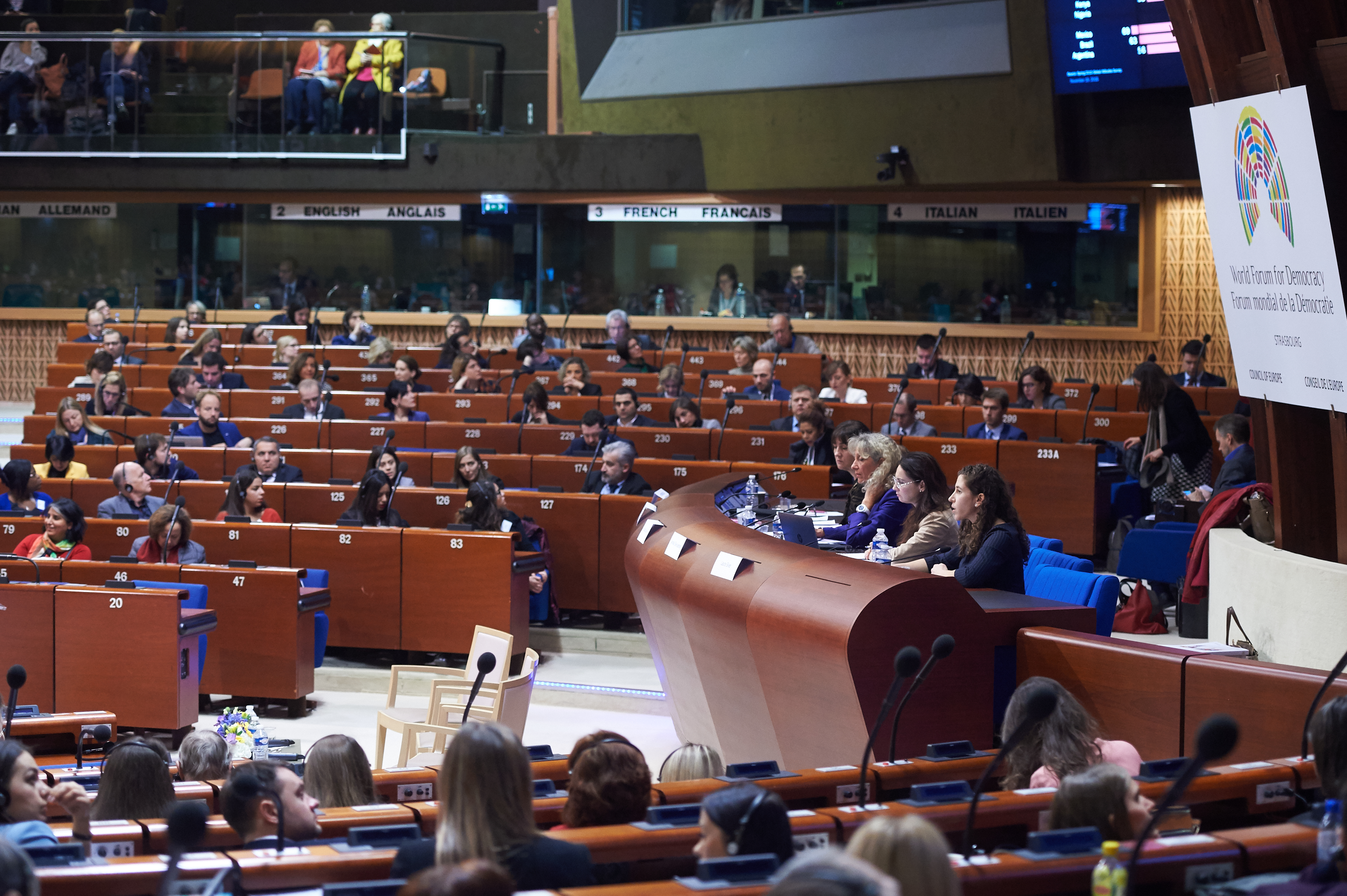TESTIMONY
Gabriella Gillespie, who grew up with a Yemenite father and a British mother, shared her story at the World Forum on Democracy in Strasbourg, dedicated to gender equality and equal rights for men and women. Words of horror reverberated amidst the silence of the Assembly Hall of the Council of Europe, giving voice to all forms of imposition, violence, injustice. A tragic experience that destroyed a family and that continues taking a heavy toll on the young generation. Based on that experience, today her struggle is to ensure full rights and freedoms to women

“It all began when I was 6 years old. One day, mother had brought us to school but we were picked up by our father, which had never happened before. When we asked about our mother, he told us she had left.” It’s the moment of storytelling at the World Forum for Democracy, held at the hemicycle of the Council of Europe in Strasbourg (November 19-21). Gabriella Gillespie shares with the audience her experience of suffering, with great difficulty, slowly but with great dignity and with no hesitation. Her testimony was received in utter silence and attention. Gabriella was raised in Wales by her Yemeni father and her British mother, until her father sold her as a child bride when she was 13 years-old.
 Her mother was cut in pieces. But her tragedy began earlier. “I am the youngest of four sisters.” Twelve months after her mother had vanished, her father was arrested on charges of murder. “But my mother’s body was never found. He probably cut it in pieces and burnt it.” She described the macabre details as matter-of-fact. The girls were moved to a foster home and her father was sentenced to 6 years for manslaughter, until he was released 4 years later for good behaviour. “The Social Services decided that we had to return to live with him. They placed us back into his hands. Then on my 13th birthday me and two of my sisters left for what our father described as a holiday. He told us that our uncle would be waiting for us at the airport. It was 1977”
Her mother was cut in pieces. But her tragedy began earlier. “I am the youngest of four sisters.” Twelve months after her mother had vanished, her father was arrested on charges of murder. “But my mother’s body was never found. He probably cut it in pieces and burnt it.” She described the macabre details as matter-of-fact. The girls were moved to a foster home and her father was sentenced to 6 years for manslaughter, until he was released 4 years later for good behaviour. “The Social Services decided that we had to return to live with him. They placed us back into his hands. Then on my 13th birthday me and two of my sisters left for what our father described as a holiday. He told us that our uncle would be waiting for us at the airport. It was 1977”
Gabriella had bought new clothes for the trip, for she believed it to be a vacation. After having landed in Yemen, they were met by their uncle and by “an indescribable cultural shock. My father’s family was Muslim, but he had never given us a religious upbringing. We felt completely lost. We didn’t understand what was going on. Around us we saw mostly men and just a few women, dressed in black from head to toe.”
To repay a debt … Her uncle locked them inside an apartment for several weeks. “We kept on weeping.” After a few weeks her 14-year-old sister was sold to a man from the UK who worked in an embassy. “We were sent to the north of the Country and then to Mugrahba, a rural village with no running water, electricity, schools, police, in the middle of nowhere. We were forced to wear a djab and sometimes the burka.
We were forced into doing what all women did, that is, to take water from the well at 4 km distance, 5-6 times a day, and to cook meals. If we dared to protest we’d get beaten up. My father arrived a few weeks later with my older sister. He had to repay a debt. So my 17-year-old sister was sold to a 60-year-old man.” Gabriella went on to describe her sister’s abuse by her father for years. On the third day of the marriage feast, her sister committed suicide. “Being women we were forbidden to mourn her, and we were not told where she had been buried.”
More violence and 5 children. “But it didn’t end there. My sister and I were well aware of what lied ahead of us.” Gabriella made every attempt and implored an 18-year-old youth in the village to ask her in marriage to her father. They got married, but he died after 6 months and Gabriella was forced into marriage with one of the richest men in Yemen. At the age of 14 she gave birth to her first child, then to other four children, amidst continued cruelty. “I was repeatedly beaten up almost to the point of dying, I was completely broken.” This part of her tragedy lasted another 17 years. “That’s the time it took me to discover my rights”, namely, that as a British citizen she could ask for help at the British Embassy. That’s how Gabriella managed to flee with her five children.
Another year went by before she could leave the country with her children: they were not registered on her passport and being a woman she had no right to bring them with her. But the embassy protected her and helped her go into hiding during that period. Until she finally returned home. “I arrived in Great Britain without a penny. At the time the victims of trafficking had to pay all the expenses of the return trip.” This is no longer the case today: after a campaign by Womens Rights Organizations in the UK the charges placed on child victims who are repatriated have now been withdrawn. However adult victims must still pay, she pointed out. Gabriella’s father died 9 years ago in Yemen, she had completely lost track of him. One of her sisters remained in Yemen, where still today “a father has full power over his daughters.” However, she added, “there are sane and insane people all over. Even among the Yemenites. And it’s thanks to Yemenite people if I am here today.”
“I see progress.” The conclusion of the appalling story is a cry of solidarity: “The most horrible thing of what happened in 1977 is that many young women continue suffering the same fate. Today I work with survivors, while young girls are still victims of the same tragic experiences. Every day I ask myself how all of this can be stopped. I wonder if we are doing everything possible to put an end to these horrors. But it’s still happening. And it breaks my heart.” Then the Q&A session began in the hemicycle in a surreal atmosphere. So Gabriella added further details to her story and commented on what’s still happening today. “All of this had an impact on my children, and today it affects every aspect of my life. These traumas are passed down from one generation to the next.” Three of her children have erased all memories of those years, the two older ones did not.
“I don’t hold on to the past, I look ahead to the future, because my children are with me, and this is an opportunity.” “We do speak about the sad moments, but we have overcome them and I’m no longer worried.” Gabriella repeatedly voiced her concern for all the women who today are still victims of everything that she had to go through. “It was hard for me to come here today. I was hurting”, she added. “But I am here, I look around me and I see progress. I come from a context that is struggling, and I struggle too, although I have not completed my studies. I left school at 13 to go on a “holiday” and I could never resume my studies because I was too busy raising my children.” “I see progress. I see that other people like myself are fighting, each in their own way, and I ask myself how we can help thousands of young girls and prevent them from living my same fate. It’s a huge endeavour and I am very worried.” “It’s unbearable to think that people still lack the right to marry the person they love; that many people are forced into marriage, that it’s a choice imposed by the family.”